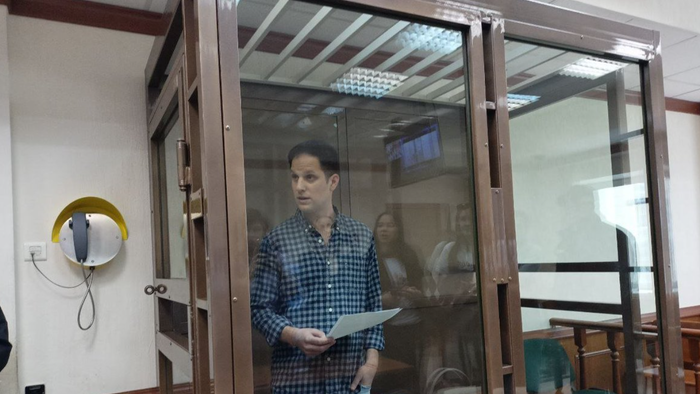


Journalist Evan Gershkovich was seen for the first time since his arrest in a Moscow court on Tuesday, where a judge upheld his continued detention on charges of espionage, which the Biden administration has condemned as a false, trumped-up charge.
The 31-year old Wall Street Journal correspondent is the first American journalist to be detained in Russia since the Cold War. He's now expected to be held at the notorious Lefortovo Prison until at least through the end of May, following the judge rejecting his legal challenge to pre-trial detention.
His lawyers tried to argue he should be freed on bail or placed under house arrest. The bail suggested was 50 million roubles (or $614,000) - but the court cited the severity of the charges to deny the requests.
If convicted he could face 20 years in prison. The US considers that he's a hostage of the Russian government, following the US changing his status last week to "wrongfully detained". He's reportedly optimistic, having met with the US ambassador to Moscow Lynne Tracy the day prior to his court appearance:
“He’s in good health and remains strong,” Tracy said after their meeting. “We reiterate our call for his immediate release.”
His attorney, Tatiana Nozhkina, told reporters Gershkovich was reading Russian literature and is “in a combative mood, denies he is guilty, and is ready to prove it.”
President Biden has said "it’s totally illegal what’s happening," while the State Department decried the Kremlin's "ongoing war against the truth" and persecution of journalists.
The Biden administration’s special presidential envoy for hostage affairs, Roger Carstens, said last week: "The most important thing is we know Evan’s not a spy. He never was a spy. He’s never worked for the U.S. government. He’s a journalist who works for The Wall Street Journal. And as the president and secretary said, ‘Journalism’s not a crime."
In late March, Russia's Federal Security Service, known as FSB, said in a statement it detained Gershkovich in the eastern city of Yekaterinburg, about 900 miles east of Moscow in the Ural Mountains.
The FSB said the reporter was there "on the instructions of the United States" and that "he was collecting information about one of the enterprises of the Russian military-industrial complex, which constitutes a state secret." But the WSJ has emphasized he was in Russian doing standard investigative reporting.
